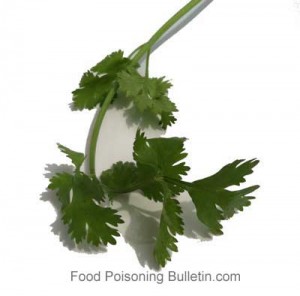 A cilantro Cyclospora outbreak has sickened 218 people in Texas and Wisconsin this summer. Normally, Cyclospora infections are associated with travel to developing countries. But for the last three summers, the parasite has travelled here.
A cilantro Cyclospora outbreak has sickened 218 people in Texas and Wisconsin this summer. Normally, Cyclospora infections are associated with travel to developing countries. But for the last three summers, the parasite has travelled here.
In 2013, 631 people in 25 states were sickened in multiple, overlapping Cyclospora outbreaks from June through December. Health investigators determined that the outbreaks had multiple food sources and that most of the illnesses were linked to tainted produce imported from Mexico.
About 80 percent of the cases were from three states: Iowa, Nebraska and Texas. The 227 cases in Iowa and Nebraska were linked to a commercial bagged salad mix produced by Taylor Farms of Mexico and served at Olive Graden and Red Lobster restaurants. Several lawsuits were filed.
Cyclospora causes an infection called cyclosporiasis which causes profuse, often explosive, diarrhea that can last up to two months. Other cyclosporiasis symptoms, which can also last more than 60 days, include abdominal cramps, bloating, gas, nausea, fatigue, loss of appetite, weight loss, vomiting, body aches, low-grade fever, and other flu-like symptoms.
The 270 Texas cases in 2013 were linked to contaminated cilantro imported from the Puebla region of Mexico. The cause of the remaining 126 illnesses was never identified.
In 2014, 126 people in Texas were sickened by cilantro sold at grocery stores and served at restaurants. Health officials never disclosed the name of the establishments linked to the outbreak because there was was no product left to test by the time illnesses were discovered. But they did trace back the contaminated cilantro to farms in Mexico’s Puebla region.
So far this summer, 210 cases have been reported in Texas, many of them in Travis County which includes the Austin metropolitan area. The Austin, Dallas and San Antonio metro areas have also been hard hit.
In Wisconsin, eight cases have been linked to the tainted cilantro. All of those who became ill ate at the same restaurant the name of which has not been disclosed by health officials.
U.S. Food and Drug Administration (FDA) officials investigating the outbreak visited cilantro farms and processing facilities in the Puebla area where they found human waste and toilet paper in the fields and other unsanitary conditions.
Several of the operations had no toilet or hand washing facilities. Others lacked soap, toilet paper, paper towels or running water. Crates used to transport the vegetables were visibly dirty, and water used to wash cilantro was vulnerable to contamination from sewage/septic systems. At one firm, water in a holding tank used for employee hand washing contained Cyclospora.
Based on these findings, the FDA concluded that cilantro was being contaminated when the parasite was shed in human feces left in the growing fields and issued an import alert on cilantro from that area. The alert essentially bans cilantro imports from that area, allowing U.S. officials to detain without physical inspection any shipments of fresh in tact or chopped cilantro from the Puebla region from April 1 through August 31. But no cilantro is recalled at this time.
Why no recall? Because, according to the FDA alert, “no single supplier (including retail outlets or distribution centers), packing date, shipping date, or lot code can explain all the illnesses.” The distribution was widespread.
That doesn’t leave cilantro-loving consumers much to go on. The safest route would be to stick with domestic sources of cilantro when shopping at grocery stores and to think carefully about ingredients in dishes when ordering out at restaurants.
Cyclospora is difficult, almost impossible to wash off. And the hardy parasite can survive periods of freezing temperatures. Killing cyclospora with cold temperatures requires that it be frozen for 24 to 48 hours at temperatures lower than 24.8˚ At freezing temperatures above 25˚ F, Cyclospora can survive. But it can’t survive high temperatures, cooking kills the parasite.
Anyone who does develop symptoms should see a doctor. Tests can confirm if there is a parasitic infection and antibiotics can treat it. Cyclosporiasis is normally treated with Bactrim, Septra, or Cotrim. These drugs contain sulfa and those with allergies to sulfa cannot take it.
In addition to the outbreaks over the last three summers, there has been one other Cyclospora outbreak linked to to cilantro. In 2011, 12 people who ate at a Florida restaurant developed infections.
Other kinds of produce have also caused Cyclospora outbreaks. Raspberries, snow peas, basil, and mesclun have been named as outbreak sources in the past. Last August, three people in the southeastern part of Michigan developed cyclosporiasis. The food source was never identified.




